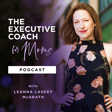
How Executive Coaching Helped Me Rebuild Confidence and Redefine Success After Motherhood: Angela’s Story
In this incredibly inspiring episode, executive mom Angela Pontius shares how coaching helped her rediscover confidence, set boundaries, and redefine what success looks like after becoming a mother. As a self-identified perfectionist and first-generation immigrant who built her identity around achievement, Angela opens up about the challenges she faced after the birth of her first child: feeling lost, burned out, and unsure of how to balance her career and motherhood.
Over two years of coaching with Leanna, Angela has shifted from over-preparing and doubting herself to trusting her instincts, leading with authenticity, and creating a sustainable work-life balance. She speaks candidly about imposter syndrome, mom guilt, redefining confidence, and the power of journaling, reflection, and mindset work.
If you’ve ever struggled to feel “good enough” in both work and motherhood, Angela’s story will resonate deeply, and remind you that change is possible when you invest in yourself and give yourself permission to slow down, reflect, and grow.
Full transcript available here.
Connect with Leanna here.
If you're ready for deeper transformation, check out The Executive Mom Reset — Leanna’s six-month coaching program designed to help ambitious moms stop merely surviving and start thriving. Book a consult now!

